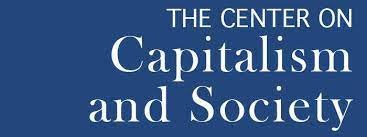Introductory Remarks: Is the Pension/Medical Care Overhang a Threat
to Prosperity? to Dynamism? to the Economic Systems Itself?
Edmund S. Phelps Columbia University
I’m delighted to see the 2nd Annual Conference of Columbia’s Center on
Capitalism & Society coming to realization. The Center came into existence
in 2001 and joined the Earth Institute in 2002 at the invitation of Jeffrey
Sachs. As for presentation in public, we opened last year, in New York, with
our Inaugural Conference and next year it’s on to Venice. Some of the Center
members who would have liked to be here were unable to come but we do
have Andrzej Rapaczynsky and Jeff and myself carrying the banner.
I’m grateful to various entities within the University of Iceland – particularly
to Gylfi Magnússon, Dean of the Faculty of Economics and Business
Administration, Tryggvie Herbertsson, head of the Institute of Economics,
and Gylfi Zoega, of the Department of Economics – grateful also to the
Central Bank and to President Grimsson.
This conference is not just my inspiration, of course – but part of the inspiration
is mine. So let me say a few words about my thinking on this subject.
Early in my career I set out a model of how consumer demand and the
demand for leisure too are functions of expected future incomes net of future
taxes; I went on to argue that households may be misled into believing they
are wealthier than they really are if the present rate of (lump-sum) taxation is
below the steady tax rate that would just suffice to cover government
expenditures and transfer payments. So I was horrified when Pres. George
Bush pushed through legislation reducing tax rates in 2001 and again in 2003
at a time when experts such as Larry Kotlikoff were calculating that tax rates
needed to be raised to cover the upcoming entitlement spending. I thought
that, as a result of the Bush cuts, the economy’s consumption would go far
above its equilibrium path and labor-force participation far below its
equilibrium path – at the cost of a wrenching downward adjustment once
households came to perceive correctly how much their taxes would be
increased (or how much their entitlement benefits would be decreased).
In the age of Rational Expectations, however, it is not politically correct to
suppose that households would seriously under-forecast their future tax bills
or over-forecast their future entitlement benefits. So Hian Teck Hoon and I
have worked on a series of papers in which households correctly predict the
future. Yet there is a problem. I won’t trespass on Hian Teck’s exposition
except to say this: The implication of the analysis, I believe, is that if the
theoretical economy faces a correctly anticipated bulge of entitlement
spending in the future, then the stock market will already be on a downhill
path—and present share prices will be already depressed in the present
relative to what they would otherwise be in anticipation of the still-more-depressed
shares prices that will prevail in the years of the entitlement bulge.
In the model – and in my kind of model generally – the implication is that
along the RE path, investment activities are already reduced on account of
the prospect of the entitlement bulge, and will be still more reduced in the
future until the economy passes through the bulge and gradually recovers.
And theoretically that implies in turn a reduced level of employment already
and employment getting worse before it finally gets better. (Empirically, we
don’t yet observe historically high unemployment rates except in Italy,
France and Germany; but I have the impression there is a wide tendency
toward falling labor-force participation rates.) In this model, when tax rates
are raised or benefits are cut is of less importance, though interesting.
The question I hope we can address from time to time is this: If such a
scenario has predictive value, what will be the side-effects on people’s
satisfactions from work in the market economy – particularly in the more
entrepreneurial economies where employment involvement has been
relatively high. Will market institutions lose popular support? Will it mean a
very tough period for capitalism, just as the 1930s proved challenging for
capitalism? For me those are troubling questions. On the other hand, maybe
something will turn up. Or maybe the numbers are not really bad. Let’s talk.
